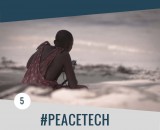Digital Games for Peace

As peacebuilders continue to explore new ways to manage and reduce conflict, digital games and apps present promising avenues for innovation. Digital games and apps are websites or web applications available on desktop computers or mobile devices that utilize game mechanics to engage users. Beyond entertainment, games can offer safe and engaging environments in which to showcase alternative narratives and develop and practice new responses to complex and dangerous situations. Games and apps for peace are part of a broader movement aiming to develop games that have social effects. While mainstream game publishers have been slower to adopt the idea, the movement is gaining momentum, as illustrated by the work of Games for Change or independent publishers such as Polish-based 11 bit studios and their critically-acclaimed release “This War of Mine“, which puts players in the role of a civilian trying to survive a siege by scavenging, hiding, and making life-or-death decisions.
Beyond entertainment, games can offer safe and engaging environments in which to showcase alternative narratives and develop and practice new responses to complex and dangerous situations. Games and apps for peace are part of a broader movement aiming to develop games that have social effects.
To promote the use of digital games and apps in the field of peacebuilding and conflict management, the United Nations Alliance of Civilizations (UNAOC) and the United Nations Development Programme (UNDP), in collaboration with Build Up, launched the PEACEapp competition in August 2014. The aim of the competition was threefold: 1. to encourage peacebuilders and game developers whose games or apps promote dialogue and peace to share their work; 2. to reward and publicize this work; and 3. to promote the movement by opening entries to concepts for games or apps as venues for cultural dialogue and peace.
PEACEapp received over 100 entries from 42 different countries. Entries varied widely in format, nature, and target audience—some were intended to have global reach, while others were designed for a specific region or group. There is vast potential for peacebuilding games, and we are still in the early stages of their development and use, so there is no blueprint for the types of issues or mechanics best suited for the peace genre.
Developers have been experimenting with a variety of approaches. PEACEapp’s international jury was tasked with selecting five winners: three have completed games or apps and two are projects still in development. The three winners with completed games or apps received a $5,000 cash prize each, and the winners with projects in development will receive expert mentorship from Games for Change and Build Up, among other partners, to support the transformation of their ideas into fully-fledged games or apps.
Three areas stand out: developing an understanding of conflict drivers and dynamics; raising awareness of alternative, nonviolent types of engagement with conflict situations; and building empathy toward a situation or group of people.
A look through this year’s PEACEapp winners illustrates the various ways games can be leveraged to help build peace.
- The Conflict Simulation Platform is a browser-based simulation platform in which players become stakeholders and decision-makers in negotiations over conflict stemming from issues such as terrorism, migration, ethnic tensions, or climate change, to find a solution to which all delegations can agree. It is intended to be played by groups of young people globally, such as high school or university students. In the game, negotiations take place in either formal sessions or informal talks and are moderated by a chairing delegation. The sessions can last from 90 minutes in a synchronous (multi-player, real-time) game setting to up to four weeks in the asynchronous version. Facilitators can track all game events and evaluate the process. The platform’s developers at planpolitik assert that playing the game provides insights into the social dynamics of conflict management and hope to challenge players’ own beliefs about conflict management and resolution. A demo version of the game is available here.
- Haki 2: Chaguo Ni Lako (meaning “the choice is yours” in Swahili) was developed in Kenya as a response to election violence with the aim of educating voters and inspiring a commitment to peaceful and inclusive civic engagement. The game is a mobile phone app that consists of puzzles and quizzes that players solve in order to defeat Mboss, the Evil Entity, who attempts to cause civil unrest in Kenya. The quizzes include questions about political ethics, leadership, rights, and resources, contributing to the overall message of helping players make positive choices within their communities as well as nationwide. The app has a chat feature that encourages discussions about the game or individual quiz questions. Haki 2 is available as an Android app, downloadable from Google Play here.
- Everyday Racism is an Australian mobile phone app in which players can either experience acts of racism from their own racial and cultural perspective or from that of three characters: a Muslim woman, an Aboriginal man, or an Indian student. Players are confronted with four scenarios over the course of seven days. Players receive SMSs, tweets, images and videos that provide them the opportunity to witness and react to racism—by choosing from two scripted answers or electing not to respond. Scenarios are based on real-life interactions, such as buying a cup of coffee or using social media. All Together Now, which developed the app, hopes that its use will help build empathy and provide people with the skills and confidence to speak up when they witness racism. It was developed with the Australian context in mind, but the underlying principles could apply to other societies. The app is available for download from Apple’s App Store and Google Play.
- Kokoro, a virtual global community for children, aims to develop intercultural and interfaith learning to develop collaborative action. Kokoro is still in development, but its concept is based on a model of a village with different learning spaces and two modules: understanding self and others, and transforming the world together. Players are taken on an interactive learning journey through the village’s four core values of respect, empathy, reconciliation, and responsibility. The idea is to expand this concept of an interactive village into a digital game where players get together to shape the future of a society while learning about ethical issues and dealing with challenging situations. Kokoro, as a community, will also serve as a platform to introduce the “learn to live together” curriculum, including the opportunity for children to share their own ideas about learning to live together.
- Peace Superheroes, also in the development stage, aims to teach peacebuilding and conflict resolution to teenagers and young people by taking real-life peace heroes and fictionalizing them. In the game, players will be confronted with conflict situations, such as bullying or seeing violence in the news, and will be challenged to find nonviolent ways to engage with these issues. Users will be able to access characters with “superpowers” like tolerance and empathic listening in order to learn skills that are key to positively transforming conflict. Players will also have access to gadgets such as a needs assessment barometer, truth-reflecting mirrors, or a judgment zapper. In some situations, players will necessarily need to collaborate. The game creators hope to provide players with a safe space in which to try out nonviolent responses to conflict. Individuals can then become agents for positive change for themselves, their families, and their communities, in the real world.
While the five winning games share the overall objective of helping to build peace, they also demonstrate a wide variety of approaches to doing so, which underscores the vast potential of using digital games and gamified apps in the field of peacebuilding. To further explore this potential, a representative of each of the five winners will be invited to present their work at the Build Peace 2015 conference in Cyprus to discuss progress and future directions.
The highly-innovative approaches highlighted by the PEACEapp competition notwithstanding, it is still early for the field of games for peacebuilding, and much work remains. But with awareness of their potentials growing fast (the United Nations Educational, Scientific and Cultural Organization and the Mahatma Gandhi Institute of Education For Peace and Sustainable Development launched their own gaming challenge earlier this year), the hope of the PEACEapp competition organizers is to gather the talent, experience, and innovation behind existing projects and initiatives into a more coherent and purposeful community of technologists, peacebuilders, and game developers engaged in building the next generation of games for peace.
(Feature Photo Credit: NASA Goddard Space Flight Center via Flickr)

